Follow the progress of 2019 MCD policy initiatives throughout the legislative session with our regular Legislative Updates.
On this page:
May 30, 2019
With the conclusion of the 2019 Minnesota legislative session, the Council on Disability expresses gratitude to all legislators and policy partners for their collaboration on issues identified in MCD’s 2019 Public Policy agenda. The following is a summary of the policy issues that the Council worked on and the result our work.
Minnesota Council on Disability Operating Budget
The Council on Disability thanks Chairs Liebling and Benson for the inclusion of MCD’s requested $154k budget increase in the Health and Human Services Omnibus Bill. This increase in critical funding to the budget baseline will allow the Council to maintain staffing levels and the delivery of its programmatic services.
Minnesota Council on Disability Legacy Proposal
MCD’s Legacy proposal was not included in the final Legacy Omnibus bill. The Council thanks members of the committee for their consideration.
#MNParksForAll
As a bonding bill did not occur this year, Governor Walz and MCD’s request for $19.5 million for accessible state parks was not funded. MCD will pursue this goal with vigor in the 2020 legislative session.
Accessibility of Public Buildings
MCD thanks Senator Draheim and Chair Mahoney in chief authoring HF772/SF937 to update outdated language in Minnesota’s building code in regards to the accessibility of public buildings. Language from this bill was included in the Jobs Omnibus bill.
Accessibility of Assisted Living Facilities
The Council thanks Representative Schultz and Senator Housely for their critical work on legislation related to assisted living facilities and elder care. The Council will collaborate with the MN Department of Health to implement high accessibility standards in the rulemaking process following the legislative session.
Accessibility of the Capitol Complex Tunnel System
Representative Rod Hamilton understands the challenge of navigating the Capitol Complex tunnel system that people with disabilities have. He uses a wheelchair and climbs the inaccessible, steep tunnel between the State Office Building and the Capitol every day. He and Senator Koran introduced a bill that would fund an effort to improve the tunnel to be ADA compliant (HF2660/SF2618). As a bonding bill did not occur this session, MCD urges this proposal to be funded in the 2020 legislative session.
Connected and Autonomous Vehicles (CAV) Policy
MCD has been a strong supporter of authorizing the testing of autonomous vehicles on Minnesota roads and has provided testimony on both House and Senate bills to do so. Action on autonomous vehicle technology will not occur in this legislative session. MCD will support the testing and adoption of autonomous vehicle technology in the 2020 legislative session.
PCA Driving Reimbursement
The Council thanks Representative Mann and Senator Matthews for authoring HF2536/SF2715, which would expand reimbursable driving activities for PCAs in order to ensure the implementation of a person with disability’s service plan. MCD will work with stakeholders next year to pass this crucial legislation into law.
Voters with Disabilities
The Minnesota Council on Disability thanks the Office of the Minnesota Secretary of State, Steve Simon and legislators on the several bills to improve the experience for voters with disabilities. These bills are: HF1152, HF1098, HF94, HF1372, and HF14.
ADA Notice to Businesses Working Group
The bill HF803/SF806 convenes stakeholders to develop a report of recommendations regarding providing businesses notice of potential barrier violations. This bill was not included in the final omnibus bill.
Website Accessibility Grants
MCD thanks advocate Noah McCourt, Representative Elkins, and Senator Dziedzic for their work on HF1358/SF1058 to create website accessibility grants for cities and counties. This bill was not included in the final State Government Finance Omnibus bill. MCD supports this legislation being passed in the next legislative cycle.
Legislative Digital Accessibility Working Group
MCD applauds the Minnesota Commission for the Deaf, Deaf-Blind, and Hard of Hearing for their work on HF1962/SF1727 which would convene a working group to establish digital accessibility standards for the MN Legislature. This bill was passed in the State Government Finance Omnibus bill.
Employees with Disabilities Workgroup
MCD thanks the Minnesota Commission for the Deaf, Deaf-Blind, and Hard of Hearing for its work on HF1968/SF2004 to establish a working group to analyze best practices for hiring and retaining state employees with disabilities. This bill was passed in the State Government Finance Omnibus bill.
The Minnesota Council on Disability exists to serve people with disabilities in Minnesota through development of effective policy, training, technical resources and collaborations with public and private stakeholders. Any policy inquires can be directed to Public Policy Director Kody Olson at kody.olson@state.mn.us.
May 24, 2019
As the 2019 legislative session comes to a close, the Council reminds you that the agency serves as a technical resource for legislators, its staff, and its constituents on issues relating to disability policy. Policy inquiries can be referred to Public Policy Director, Kody Olson, who can be reached at kody.olson@state.mn.us.
While the Minnesota Legislature adjourned on its constitutional deadline of May 20th, the work is far from over. Having just passed a single budget, our legislative leaders have called a special session to complete the task of passing a two year budget for the state. The Governor, House Speaker, and Senate President reached a budget agreement (PDF), which must be finalized in conference committees during the special session.
One of the conditions of the budget included reducing the provider tax from 2% to 1.8%. This resulted in a -$357.85 million target for the Health and Human Services budget. The Minnesota Council on Disability will be tracking this budget bill, in addition to the Transportation budget (PDF), Jobs and Economic Development, Energy and Commerce Policy and Finance bill and the State Government Finance bill (PDF).
In the final negotiation hours, the Council on Disability urges you to contact your legislator and tell them what is important to you. Find your legislator.
The Minnesota Council on Disability exists to serve people with disabilities in Minnesota through development of effective policy, training, technical resources and collaborations with public and private stakeholders. Any policy inquires can be directed to Public Policy Director Kody Olson at kody.olson@state.mn.us.
April 5, 2019
As the Legislature rolls into packaging and hearing omnibus bills, the Council on Disability would like to share progress made in the legislative session thus far.
Minnesota Council on Disability Operating Budget
The 2019 operating budget from MCD requests a modest $154k increase to the agency’s annual budget for rising operational and IT expenses. MCD’s full budget request was included in both the Governor’s HHS budget as well as the House HHS budget (HF2184). MCD thanks both governing bodies and urges the Senate to do the same.
Minnesota Council on Disability Legacy Proposal
The Minnesota Council on Disability presents a Legacy funding proposal in order to capture our legacy of Minnesotans with disabilities, celebrate our progress, and secure our future for all. The Council thanks Chair Leon Lillie and the House Legacy committee for hearing HF1337, our Legacy funding proposal. MCD also thanks Chair Ruud and the Senate Legacy committee for the upcoming hearing for the companion bill, SF1417. The Council urges both the House and Senate to include the proposal in the larger Legacy bill.
#MNParksForAll
MCD expresses its gratitude to Governor Walz’s administration for including $19.5 million to work towards making state parks accessible for people with disabilities. As the House Capitol Investment committee has heard the Governor’s bonding proposal, so too do we urge the Senate to do the same.
Accessibility of Public Buildings
MCD thanks Senator Draheim and Representative Mahoney in chief authoring HF772/SF937 to update outdated language in Minnesota’s building code in regards to the accessibility of public buildings. The Senate has passed SF937, the House has added HF772 to its Jobs and Economic Development Omnibus bill. Once passed through the House, MCD urges the Senate to adopt the updated language out of the House.
Accessibility of Assisted Living Facilities
The Council thanks Representative Schultz and Senator Housely for their critical work on legislation related to assisted living facilities and elder care. The Council will collaborate with the MN Department of Health to implement high accessibility standards in the rulemaking process, once initiated.
Accessibility of the Capitol Complex Tunnel System
Representative Rod Hamilton understands the challenge of navigating the Capitol Complex tunnel system that people with disabilities have. He is in a wheelchair and climbs the steep tunnel between the State Office Building and the Capitol every day. He and Senator Koran introduced a bill that would fund an effort to improve the tunnel to be ADA compliant (HF2660/SF2618). MCD thanks the Capitol Investment committee for hearing the bill and urges the Senate to do the same.
Connected and Autonomous Vehicles (CAV) Policy
MCD has been a strong supporter of authorizing the testing of autonomous vehicles on Minnesota roads and has provided testimony on both House and Senate bills to do so. MCD supports the passage of HF1996 and SF2173 to accelerate the testing and adoption of autonomous vehicle technology.
PCA Driving Reimbursement
The Council thanks Representative Mann and Senator Matthews for authoring HF2536/SF2715, which would expand reimbursable driving activities for PCAs in order to ensure the implementation of a person with disability’s service plan. MCD urges the passage of this bill.
Voters with Disabilities
The Minnesota Council on Disability thanks the Office of the Minnesota Secretary of State, Steve Simon and legislators on the several bills to improve the experience for voters with disabilities. These bills are: HF1152, HF1098, HF94, HF1372, and HF14.
ADA Notice to Businesses Working Group
The Council supports HF803/SF806, which convenes stakeholders to develop a report of recommendations regarding providing businesses notice of potential barrier violations. The bill has been heard in the House Government Operations committee and must be heard in the Senate.
Website Accessibility Grants
MCD thanks advocate Noah McCourt, Representative Elkins, and Senator Dziedzic for their work on HF1358/SF1058 to create website accessibility grants for cities and counties. MCD urges the passage of the bill.
Legislative Digital Accessibility Working Group
MCD applauds the Minnesota Commission for the Deaf, Deaf-Blind, and Hard of Hearing for their work on HF1962/SF1727 which would convene a working group to establish digital accessibility standards for the MN Legislature.
Employees with Disabilities Workgroup
MCD thanks the Minnesota Commission for the Deaf, Deaf-Blind, and Hard of Hearing for its work on HF1968/SF2004 to establish a working group to analyze best practices for hiring and retaining state employees with disabilities.
In the final 6 weeks of the Minnesota Legislative session, the Minnesota Council on Disability thanks all partners and stakeholders for collaborative work achieved. The Council remains optimistic and urges support in finalizing its public policy agenda for the 2019 Legislative Session.
The Minnesota Council on Disability exists to serve people with disabilities in Minnesota through development of effective policy, training, technical resources and collaborations with public and private stakeholders. Any policy inquires can be directed to Public Policy Director Kody Olson at kody.olson@state.mn.us.
March 29, 2019
The Minnesota Legislative session continues to chug steadily along. This week marks the second committee deadline, which is for committees to act favorably on bills that met the first deadline in the other house. Additionally, committee targets were released, which allows the budget building process to advance to the next stage.
The Council on Disability provided testimony on three important issues this week. First, Executive Director Joan Willshire spoke in front of the Senate Human Services Reform committee regarding the activities of the Council and discussed the agency’s budget proposal.
Willshire also testified with the House Transportation committee regarding HF1996, the authorization of Connected and Autonomous Vehicles (CAV) in Minnesota and the impact this technology will have for people with disabilities.
Public Policy Director Kody Olson testified with the House Capital Investment Committee regarding an accessibility project on the Minnesota Capitol Complex. HF2660 aims to bring the tunnel connecting the State Office Building and the Capitol building in compliance with the Americans with Disabilities Act.
Chief author of the bill, Representative Hamilton uses a wheelchair and understands the struggles that employees and visitors of the Minnesota Capitol Complex have when navigating the tunnel system. The slope is far too great for folks who utilize mobility devices to safely use the tunnel, if they do at all. The Council thanks the House Capitol Investment Committee for hearing this bill and urges the Senate to do the same.
 MCD concluded the week by hosting a wrap-up event of the Keep Moving Forward Legacy project. The Council thanks all participants and stakeholders who made the project a tremendous success. Learn more about the Keep Moving Forward project.
MCD concluded the week by hosting a wrap-up event of the Keep Moving Forward Legacy project. The Council thanks all participants and stakeholders who made the project a tremendous success. Learn more about the Keep Moving Forward project.
The Minnesota Council on Disability exists to serve people with disabilities in Minnesota through development of effective policy, training, technical resources and collaborations with public and private stakeholders. Any policy inquires can be directed to Public Policy Director Kody Olson at kody.olson@state.mn.us.
March 18, 2019
This week’s Legislative Update comes from MCD Executive Director Joan Willshire:
This week at the Capitol was the first hearing of the Connected and Automated Vehicle bill, Senate File 7123, that establishes testing for CAV in Minnesota. The bill was heard in the Senate Transportation Committee. The author of the bill, Senator Newman, proposed an amendment to the bill, which stated all pilot testing was to be conducted on private property only and could not be conducted on public roads. Also, a fee would be charged for that usage. The Minnesota Department of Transportation had many concerns about this approach, and the bill was tabled by the author.
The disability community would not support that type of fee, and we are very concerned that the bill was tabled by the author. The Minnesota Council on Disability is still hopeful that the bill can be re-energized and will get moving again. We believe the self driving car is one of the best transit opportunities for the disability community, enabling its members to live, work, and play in the community of their choice.
Two of our own Council members testified on two different bills this week. Council member Quinn Nystrom testified on the insulin bill. She told her story about having diabetes and needing to be able to have access to insulin. Council member Lauren Thompson testified how the shortage of PCAs is negatively affecting her life.
Both did a fabulous job getting their issues across to the Legislature.
The deadline to advance major bills in its house of origin was Friday, March 15. Major appropriation bills are exempt from this deadline. March 29 is the next deadline for bills to advance in the other chamber.
March 8, 2019
The achievements and contributions of Minnesotans with disabilities are bountiful, yet unheard of. Civil rights for people with disabilities in this Nation have made tremendous progress in the past several decades, and many of those important battles on the national stage happened because of Minnesotans. This week, Minnesota Council on Disability presented a funding proposal to the House Legacy Committee in order to capture our legacy of Minnesotans with disabilities, celebrate our progress, and secure our future for all. This Legacy proposal has three components.
 First, we aim to capture our legacy. Minnesotans were at the forefront of the National Disability Civil Rights Movement. We want to find those folks who sacrificed so much so that freedoms may be enjoyed today by so many with disabilities. These cherished stories of significant achievement should be heard by all and shared in many different formats: from video to audio, photography and print. Content produced will nurture and inspire all Minnesotans in a permanent exhibit which will be developed.
First, we aim to capture our legacy. Minnesotans were at the forefront of the National Disability Civil Rights Movement. We want to find those folks who sacrificed so much so that freedoms may be enjoyed today by so many with disabilities. These cherished stories of significant achievement should be heard by all and shared in many different formats: from video to audio, photography and print. Content produced will nurture and inspire all Minnesotans in a permanent exhibit which will be developed.
This is an urgent and time-sensitive matter. These leaders who are responsible for defining civil rights for an entire generation of Americans with disabilities are passing on. We all are familiar with and reflect on the recent death of former President George H. W. Bush who signed the Americans with Disabilities Act in 1990.
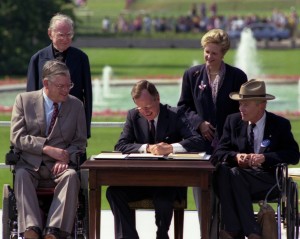
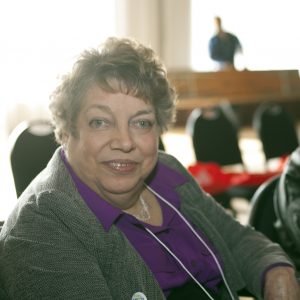 Here in Minnesota, we remember Kathy Wingen who died last month. She is a disability civil rights leader and described by people around her as “tenacious” and “a pioneer.” Because of Kathy’s efforts, we see a more inclusive City of St. Cloud. Residents can thank Kathy every time they use a curb cut or get to work through dial-a-ride. Stories like Kathy’s are exactly what we hope to capture through this Legacy proposal.
Here in Minnesota, we remember Kathy Wingen who died last month. She is a disability civil rights leader and described by people around her as “tenacious” and “a pioneer.” Because of Kathy’s efforts, we see a more inclusive City of St. Cloud. Residents can thank Kathy every time they use a curb cut or get to work through dial-a-ride. Stories like Kathy’s are exactly what we hope to capture through this Legacy proposal.
Second, we hope to celebrate our progress by hosting cultural events in 2019 and 2020 to recognize the 29th and 30th Anniversary of the landmark, civil rights legislation- the Americans with Disabilities Act. This will be a time for our community to convene and recognize all that has been accomplished in the National Disability Civil Rights Movement, reflect on the sacrifices made to enjoy the freedoms we have, and to organize our next steps.
Our events hope to engage with the Minnesota disability community, advocates, and other public members to foster knowledge of the Americans with Disabilities Act, its impact on our modern world, and generate greater understanding on the many rights afforded by it.
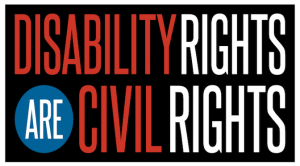 Finally, we hope to positively influence the culture of Minnesota’s professional environment by educating and informing employers on the benefits of hiring people with disabilities. In the United States, the unemployment rate for people with disabilities is 10.5%. Here in Minnesota, it is twice that. People on the autism spectrum specifically have higher unemployment rates that range between 70% and 90%. Much of the cause is due to employment discrimination and the stigma of disability in the culture of the professional world. Through this Legacy proposal, the Council on Disability hopes to build the dialogue around ending the discrimination that is pervasive in hiring Minnesotans with disabilities.
Finally, we hope to positively influence the culture of Minnesota’s professional environment by educating and informing employers on the benefits of hiring people with disabilities. In the United States, the unemployment rate for people with disabilities is 10.5%. Here in Minnesota, it is twice that. People on the autism spectrum specifically have higher unemployment rates that range between 70% and 90%. Much of the cause is due to employment discrimination and the stigma of disability in the culture of the professional world. Through this Legacy proposal, the Council on Disability hopes to build the dialogue around ending the discrimination that is pervasive in hiring Minnesotans with disabilities.
We aim to shift the conversation from “what is the expense of employing people with disabilities” to “what is the value of including people with disabilities in our workforce?”
We thank the House Legacy committee for hearing our proposal and look forward to engaging with legislators and other stakeholders in executing this vision.
The Minnesota Council on Disability exists to serve people with disabilities in Minnesota through development of effective policy, training, technical resources and collaborations with public and private stakeholders. Any policy inquires can be directed to Public Policy Director Kody Olson at kody.olson@state.mn.us.
March 1, 2019
Governor Tim Walz introduced a bonding proposal (PDF) this week that included $19.5 million towards making our state parks accessible for Minnesotans with disabilities. Accessible state parks is an issue that Minnesota Council on Disability adopted in its 2019 Public Policy Agenda and has long worked on. The Council applauds the Governor’s office for recognizing this critical need in their proposal and urges the Minnesota Legislature to strongly consider this proposal.
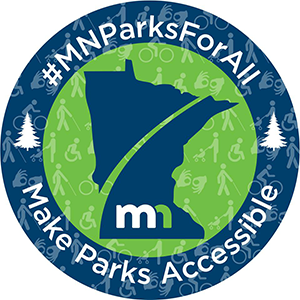
MCD’s Access Specialist, Margot Imdieke Cross testified in the House Commerce Committee regarding HF772 to modify our building code around the accessibility of public buildings. The bill passed committee and is moving onto the House Labor Committee.
On Thursday, Public Policy Director Kody Olson provided testimony, regarding HF1358, about the accessibility of our online world:
As buildings need ramps and sidewalks need curb cuts, so too does our digital environment need to be built for all. Our Council has institutional expertise and serves to advise our state government, business owners, and other stakeholders in Minnesota on this very issue.
Let me be clear, the digital realm is no longer a privilege for some–it is a right to all. Title II of the Americans with Disabilities Act mandates that our government and its services be accessible for everyone. Much of government business is conducted digitally. Ranging from snow emergency alerts to informational videos on public health, applying for permits and paying taxes and fines. Accessible government, especially digital government, allows for people with disabilities to live independently in the community of their choice.
Because of our online world, people with disabilities can conduct business anywhere at any time. We have seen a rise in folks with disabilities asserting their civil rights to inclusion in the digital world through legal action. The Department of Justice has ruled against many government entities in this arena–many have been institutions of learning.
The Minnesota Council on Disability is in strong support to provide tools and resources to government entities for the full participation of citizens (taxpayers) with disabilities and to reduce legal liability. We urge you to vote in the affirmative on HF1358.
The Minnesota Council on Disability exists to serve people with disabilities in Minnesota through development of effective policy, training, technical resources and collaborations with public and private stakeholders. Any policy inquires can be directed to Public Policy Director Kody Olson at kody.olson@state.mn.us.
February 22, 2019
This week, Governor Walz’ Administration released their budget proposal for the next biennium. It highlighted significant investments in many different programs for Minnesotans with disabilities. First, the Governor proposed an investment in the Minnesota Council on Disability through a budget increase. This is to support the Council’s work and maintain current operations in an environment with increasing costs.
In conjunction with the Governor’s budget, Commissioner Jan Malcom with the Department of Health released draft legislation related to the licensure of assisted living facilities (PDF). The Governor’s budget calls for a dramatic expansion of the state’s ability to fight abuse and neglect of Minnesota’s elders who live in care facilities across the state. The proposal supports a $62.5 million investment over the next four years to expand consumer protections and increase the enforcement powers of the state. It also calls for licensure of assisted living facilities. The proposal calls for a higher level of accessible rooms in newly licensed facilities. The Council will be working with the Department of Health, Governor Walz’s team, Senator Housely and Representative Schultz and Olson to bolster accessibility standards in these facilities.
The Governor’s budget also called for a $1.5 billion transit package to provide comprehensive investment in multi-modal transportation. The plan calls for Metro Mobility to be moved to its own separate budget that prioritizes service for people with disabilities. By doing so, the Metro Mobility service will no longer compete with the bus system for resources. The package also calls for investment in the consumer experience, notably enhancing accessibility for sidewalks, snow removal, and signage.
The Council testified in support of HF 803, authored by Rep. Fischer. This act calls for a working group to develop recommendations for providing notice to business owners regarding compliance with the Americans with Disabilities Act. As the bill currently states, the Council on Disability would be a member of the working group. As our agency communicated with the chief author and the Department of Labor and Industry, it became clear that the Council should serve as the host of the working group to ensure the conversation is framed in the context of civil rights enforcement. The bill passed committee and will head to Ways and Means.
Finally, Disability Day at the Capitol was a smashing success. Attendance was high with several hundred Minnesotans with disabilities advocating for inclusion and independence. The Council on Disability held a Council meeting at the Capitol coinciding with this day. Our Councilmembers were eager to meet with their elected representatives and share disability policy issues in their community. It was a highly successful day.
The Minnesota Council on Disability exists to serve people with disabilities in Minnesota through development of effective policy, training, technical resources and collaborations with public and private stakeholders. Any policy inquires can be directed to Public Policy Director Kody Olson at kody.olson@state.mn.us.
February 15, 2019
The policy team at MCD is pleased to share progress made on its policy agenda, as well as introduce several new items. Council Building Access Specialist, Margot Imdieke Cross, provided testimony to the Senate Jobs and Economic Growth Finance and Policy committee regarding SF 937. This bill aims to modify MN building code regarding the accessibility of our public buildings and provide further clarity on obligations and responsibilities that our government has to Minnesotans with disabilities. The bill passed the committee and is heading to the floor. Look on the House side for the Commerce committee to hold hearings on the companion text, HF 772.
The Council authored two bills in both the House and the Senate this week. MCD’s budget bill was authored in the House by Rep. Loeffler and in the Senate by Sen. Relph. The Council has also authored a bill for a Legacy Fund proposal to capture the legacy of Minnesotans with disabilities through multi-media production and distribution of content. Rep. Hausman authored the bill on the House side and Sen. Mathews is the chief author in the Senate. The Council expects hearings on these bills soon.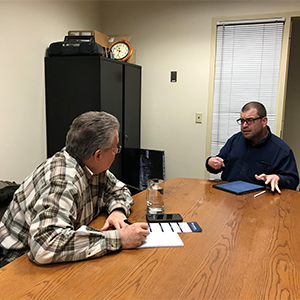
MCD staff thank Rep. Elkins of District 49B for stopping by our office and chatting about the accessibility of our digital world. We look forward to future collaboration on excellent public policy.
Finally, the Council is pleased to publicize its updated policy agenda. The document can be viewed here: 2019 public policy agenda (PDF).
Follow the Council on Disability on our website and social media to follow the status of this policy and other legislation that impacts Minnesotans with disabilities. MCD is on both Facebook and Twitter, and provides weekly updates on the legislative session on the blog hosted on its website.
Mark your calendars: The 2019 Disability Day at the Capitol is on February 19th. The Minnesota Council on Disability is a sponsor of the event. Information on the event can be found on The Arc Minnesota’s website.
The Minnesota Council on Disability exists to serve people with disabilities in Minnesota through development of effective policy, training, technical resources and collaborations with public and private stakeholders. Any policy inquires can be directed to Public Policy Director Kody Olson at kody.olson@state.mn.us.
January 31, 2019
The Minnesota Council on Disability policy staff continued to meet with legislators on committees related to MCD’s 2019 public policy agenda (PDF).
One policy item that continues to gain traction is the Transportation Network Company (TNC) legislation. A transportation network company, sometimes known as a mobility service provider or ride-hailing service, is a company that matches passengers with drivers via websites and mobile apps. Two popular TNC companies operating in our state are Uber and Lyft.
These companies are being discussed to identify ways to standardize operations in all communities of Minnesota. The MN Council on Disability was part of a larger workgroup convened by the Minnesota League of Cities to identify stakeholder needs and concerns. In engaging with our disability community, we learned that many Minnesotans with disabilities do not consistently receive equitable services on TNC platforms.
Minnesotans with disabilities who use a service dog expressed that TNC drivers would frequently deny service to them, despite the fact that federal law prohibits this practice. Reporting such discrimination was challenging and consequences for drivers were not satisfactory. The Council believes that legislation should protect these consumers and guarantee their rights to use services. Blind, low-vision, Deaf and consumers with autism expressed concerns regarding the digital accessibility of TNC platforms and wanted to ensure that policy ensures digital access.
Minnesotans who use wheelchairs and other mobility devices are consistently challenged to find equitable, on-demand transportation on these platforms to meet their needs. There are simply not enough Wheelchair Accessible Vehicles (WAV) operating on our streets to meet the demand. The reasons why are not hard to find. These vehicles are expensive to purchase–a new WAV can cost from $60-80,000. Maintenance costs related to the equipment and fuel are also quite expensive. The Council recognizes that the TNC business model is not cost-effective for providing WAV services and believes that the State has a role in facilitating financial incentives for entrepreneurs and companies that provide these needed services.
As ruled in federal court, TNC companies are a public service company and must adhere to the Americans with Disabilities Act by providing equitable services to all. A full report on this issue [pages 278-292] can be found with the National Council on Disability. The Council’s full policy position on this issue can be found at: Accessible Policy Solutions for Transportation Network Companies in Minnesota.
Follow the Council on Disability on our website and social media to follow the status of this policy and other legislation that impacts Minnesotans with disabilities. MCD is on both Facebook and Twitter, and provides weekly updates on the legislative session on the blog hosted on its website.
Mark your calendars: The 2019 Disability Day at the Capitol is on February 19th. The Minnesota Council on Disability is a sponsor of the event. Information on the event can be found on The Arc Minnesota’s website.
The Minnesota Council on Disability exists to serve people with disabilities in Minnesota through development of effective policy, training, technical resources and collaborations with public and private stakeholders. Any policy inquires can be directed to Public Policy Director Kody Olson at kody.olson@state.mn.us.
January 18, 2019
The Minnesota Council on Disability policy staff held over a dozen meetings with legislators promoting the agency’s 2019 public policy agenda. Senator Draheim authored and jacketed a bill related to the Accessibility of Public Buildings. This housekeeping bill is one of the Council’s priority items, and serves to provide clarity to MN State Statute 326B.106. Current language in the building code conflicts with the requirements of Title II of the Americans with Disabilities Act and the Minnesota Human Rights Act.
Current state statute specifies that state buildings built or remodeled after July 1, 1963 are only required to make accessibility improvements if they are part of a different remodeling project. This language is confusing and may delay the removal of barriers in public buildings, causing programs, services and activities provided by state or local government to be inaccessible to people with disabilities. This bill serves to simply eliminate conflicting and confusing language in state statute on accessibility of public buildings.
Follow the Council on Disability on our website and social media to follow the status of this bill and other legislation that impacts Minnesotans with disabilities. MCD is on both Facebook and Twitter, and provides weekly updates on the legislative session on the blog hosted on its website.
Mark your calendars: The 2019 Disability Day at the Capitol is on February 19th. The Minnesota Council on Disability is a sponsor of the event. Information on the event can be found on The Arc Minnesota’s website.
The Minnesota Council on Disability exists to serve people with disabilities in Minnesota through development of effective policy, training, technical resources and collaborations with public and private stakeholders. Any policy inquires can be directed to Public Policy Director Kody Olson at kody.olson@state.mn.us.
January 11, 2019
As the first week of the 2019 legislative session comes to a close, the Council reminds you that the agency serves as a technical resource for legislators, its staff, and its constituents on issues relating to disability policy. Policy inquiries can be referred to Public Policy Director, Kody Olson, who can be reached at kody.olson@state.mn.us.
The Council kicked off the first legislative session by participating in the first of many weekly “Tuesdays at the Capitol” with the Minnesota Consortium for Citizens with Disabilities (MNCCD) and its partner organizations. The event serves as a platform for advocates and community organizations to gather and organize grassroots efforts. Tuesdays at the Capitol is open to the public and legislators and staff are encouraged to attend.
The policy team from MCD had a successful week in holding and securing meetings with legislators from key committees in both the House and the Senate. The Council is working diligently to advance its 2019 Public Policy agenda. MCD has been working to meet with members of the Health and Human Services committees as well as Transportation committees.
On Thursday, Senator Karin Housely introduced SF 08, or the Eldercare and Vulnerable Adult Protection Act of 2019. The bill modifies many components of healthcare related to assisted living, including: the healthcare bill of rights, consumer protection for vulnerable adults, modifies the Vulnerable Adults Act, establishes tasks forces, and requires reports. The Minnesota Council on Disability was listed as a member of the Assisted Living Licensure and Dementia Care Task Force in the bill. The accessibility of assisted living facilities is one of the adopted items of MCD’s 2019 Public Policy agenda, and the Council will be working on this bill.
Mark your calendars: The 2019 Disability Day at the Capitol is on February 19th. The Minnesota Council on Disability is a sponsor of the event. Information on the event can be found on The Arc Minnesota’s website.
The Minnesota Council on Disability exists to serve people with disabilities in Minnesota through development of effective policy, training, technical resources and collaborations with public and private stakeholders. Any policy inquires can be directed to Public Policy Director Kody Olson at kody.olson@state.mn.us.